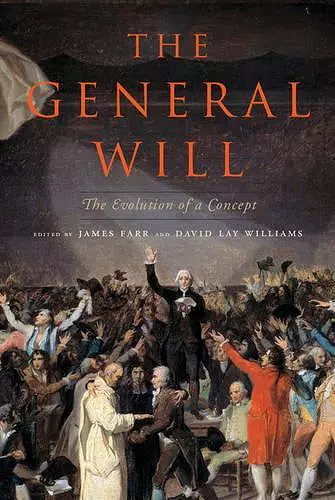The General Will
The Evolution of a Concept
James Farr editor David Lay Williams editor
Format:Hardback
Publisher:Cambridge University Press
Published:16th Feb '15
Currently unavailable, and unfortunately no date known when it will be back

Includes essays by prominent political theorists and philosophers that trace the evolution of the general will from the seventeenth to the twentieth century.
The sixteen essays of The General Will: The Evolution of a Concept, written by prominent political theorists and philosophers, chronicle the evolution of the general will, which is most centrally associated with the political philosophy of Jean-Jacques Rousseau, from the seventeenth to the twentieth century.Although it originated in theological debates, the general will ultimately became one of the most celebrated and denigrated concepts emerging from early modern political thought. Jean-Jacques Rousseau made it the central element of his political theory, and it took on a life of its own during the French Revolution, before being subjected to generations of embrace or opprobrium. James Farr and David Lay Williams have collected for the first time a set of essays that track the evolving history of the general will from its origins to recent times. The General Will: The Evolution of a Concept discusses the general will's theological, political, formal, and substantive dimensions with a careful eye toward the concept's virtues and limitations as understood by its expositors and critics, among them Arnauld, Pascal, Malebranche, Leibniz, Locke, Spinoza, Montesquieu, Kant, Constant, Tocqueville, Adam Smith and John Rawls.
'An original and wide-ranging inquiry into the general will before, in, and after Rousseau. There is no other work quite like this one, and it fills an important gap in the voluminous scholarly literature on the general will. Professors Farr and Williams have assembled a group of eminent scholars, each of whom contributes an essay remarkable for its range and erudition.' Terence Ball, Arizona State University
'This is conceptual history at its best. A formidable team elucidates, illuminates and revalues a fundamental expression in the lexicon of political thought. Tracing a great arch that stretches from Antoine Arnauld to John Rawls, with Rousseau as its capstone, this book tackles the riddle of democracy. What is it that we create when individual and free wills, having a conception of the good as their aim, constitute a sovereign people?' Mark Goldie, Fellow of Churchill College, University of Cambridge
'The general will remains one of the most challenging and perplexing concepts in the history of political thought. This excellent collection of essays, inspired by Patrick Riley's pathbreaking work, examines the antecedents of the general will, its genealogy, its expression within Rousseau's thought, and its reception by subsequent theorists and critics. There is no other volume on the general will approaching its breadth. It is indispensable for anyone who seeks to understand the development of this central idea in modern political thought.' Melissa Schwartzberg, New York University
'This book shows how fundamental the concept of the general will is in liberal and republican political thought. It also masterfully teaches us that we can and must discuss and criticize the idea of the general will, but we cannot put it away, if we want to continue to hope to have free political institutions and citizens worth the name.' Maurizio Viroli, University of Texas, Austin
'Farr and Williams have given us the definitive volume on the history of the concept of the general will. Building on Patrick Riley's groundbreaking work, this distinguished group of scholars traces the concept from its earliest use in theological debate, through the early modern period, to its classic expression in the work of Rousseau, and then beyond Rousseau to modern contractarians. The General Will is essential reading for political theorists, philosophers and historians of ideas.' Elisabeth Ellis, University of Otago
ISBN: 9781107057012
Dimensions: 235mm x 158mm x 28mm
Weight: 860g
535 pages